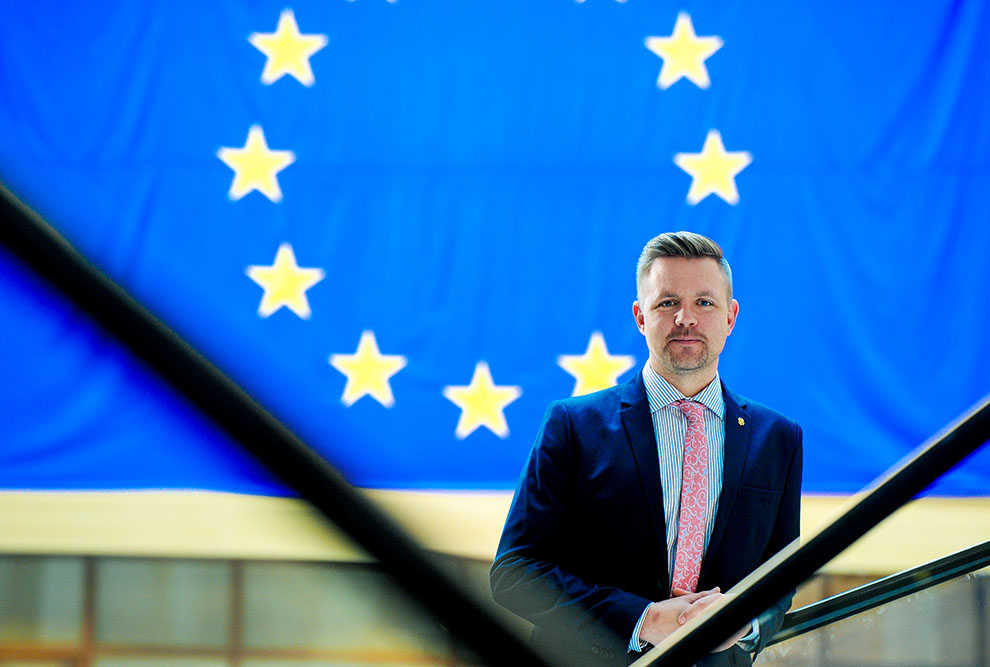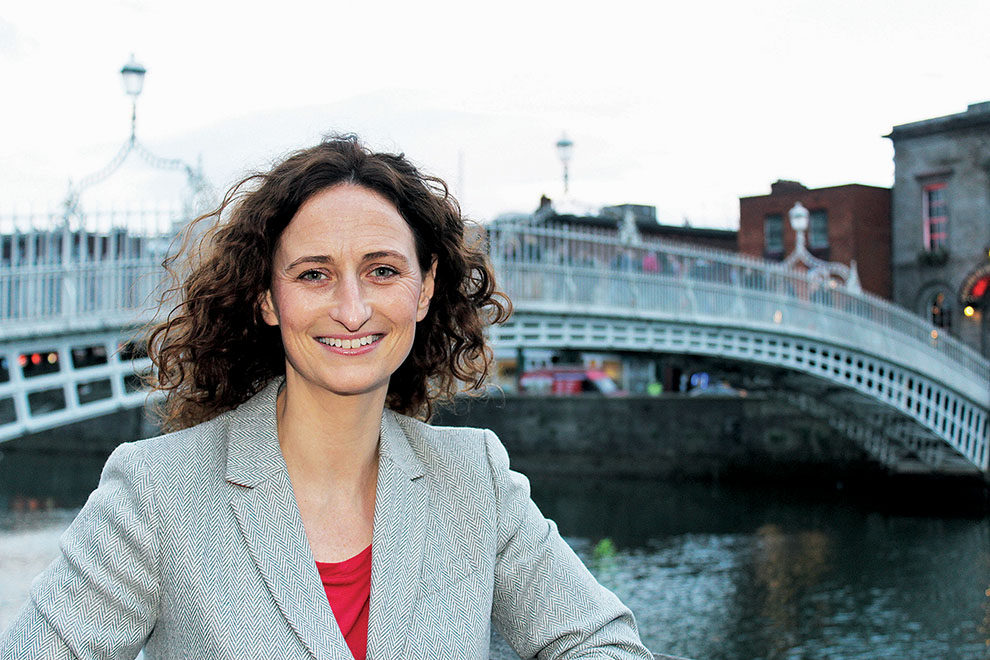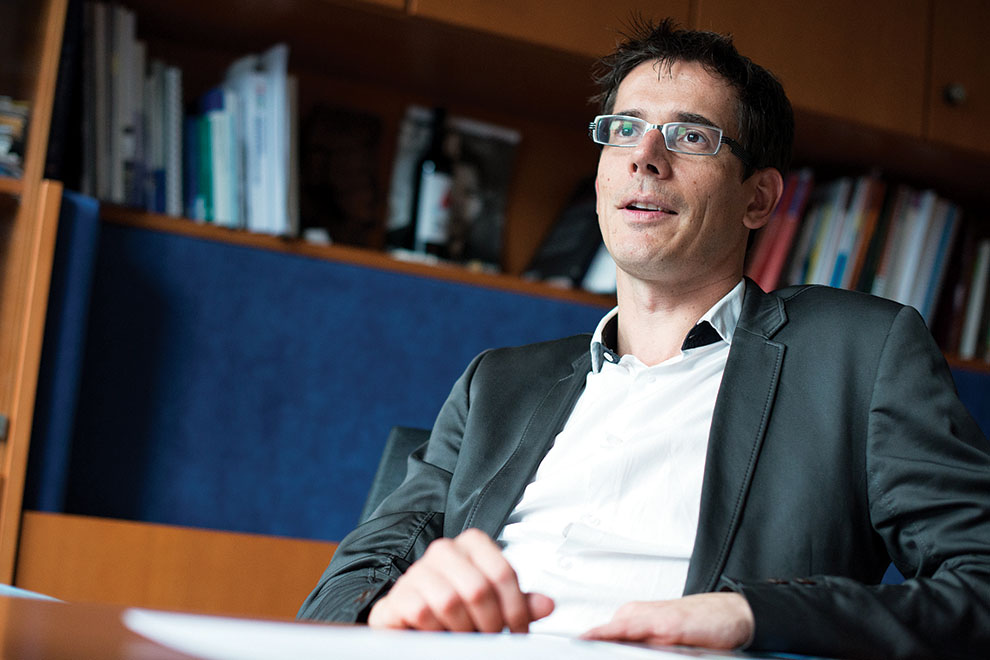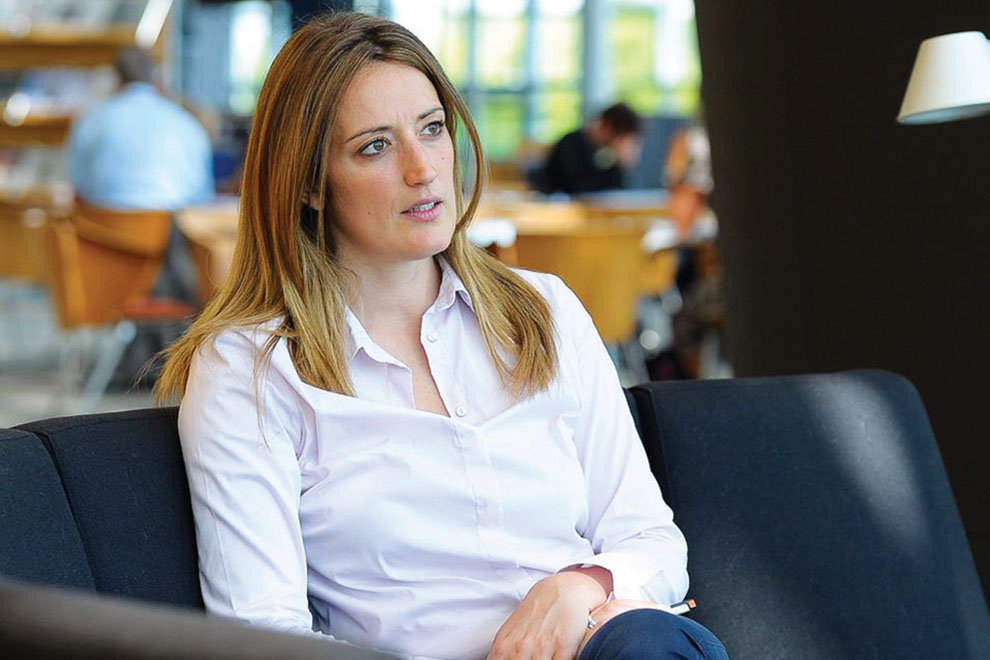The disembodied voice of a Swedish radio presenter winds up the studio-to-studio connection with Brussels and throws to Lorde’s hit song “Royals.” As the European Parliament’s operator struggles to shut down the Stockholm feed, the panellists stand and shake hands: it has been a heated discussion but the two appear to be on good terms.
Fredrick Federley is one of them: he’s a tall, blond thirty-six-year-old whose appearance reminds me of the Machiavellian spin-doctor Kasper Juul in the Danish political TV drama Borgen. I regret the facile Scandinavian association the moment we start talking, though, because cynicism is clearly not Federley’s thing.
As we walk through the basement corridors the newly elected Member of the European Parliament, or MEP, explains that the radio debate had been with fellow Swede Peter Eriksson, a Green MEP who is unhappy about how the major parties have been divvying up committee presidencies.
It is quite a revelation: there is actually a youth radio station in Sweden prepared to take a break from its top 40 playlist to discuss who should be heading up a committee in the European Parliament. Then again, it has begun to dawn on me that in some European Union countries the times have a-changed.
Once considered pasture for burnt-out politicians in the autumn of their careers, the European Parliament is now an important stepping stone for young, ambitious operators – not unlike Federley, who was an MP back in Sweden and has not ruled out a return to national politics.
“Are we going the right way?” he asks. We have ended up somewhere neither of us recognises in the labyrinthine Brussels parliamentary complex and it takes a while to get our bearings.
Federley fills me in on his political background: he is from the Swedish Centre Party, a liberal-agrarian group in the European tradition (socially progressive; economically dry). He name-checks a former leader whose ideas he admired (Karin Söder, who in 1985 became the first woman to head a Swedish political grouping) and proudly lists the Centre Party’s policy achievements. “When [European liberals] try to explain to Americans who we are politically, we say that we are left-wing Republicans or right-wing Democrats,” he says.

“I will be working alongside homophobes and Nazis,” says Fredrick Federley, who married his male partner under Swedish laws. Centerbilder/Flickr
Federley is the Centre Party’s only MEP, but says he feels ideologically at home with his new EU political family, the liberal centre-right ALDE (Alliance of Liberals and Democrats for Europe). It’s a strongly pro-European grouping that supports both human rights and the creation of a genuinely free common market within the European Union.
And while the Swede may have hit the ground running in Brussels, his election has forced him to confront issues unthinkable back home. “I will be working alongside homophobes and Nazis,” says Federley, who married his male partner under the 2009 Swedish legislation his Centre Party supported. “In this house there are quite a number of people who think I’m sick… who question me and my husband’s marriage, and our daughter.”
In Sweden attitudes are different. “We have conservatives in parliament who voted against same-sex marriage,” Federley says. “But I always knew that they never harboured any hatred towards me or my family. They just didn’t want me to get married.”
In the European Parliament, Federley could find himself in committees working with Greek extremists (the neo-Nazi Golden Dawn has three MEPs), German Hitler-apologist Udo Voigt and a range of ultra-conservative eastern Europeans. “I will be OK,” he says. “The best politician is the one who can stay cool while boiling inside.”
We emerge in the light-filled foyer on the third floor of the Altiero Spinelli building. The place is bustling with young staffers and interns wearing ID cards, heading to or coming from the lifts to the offices above. At the café people speak to each other in euro-English (“will you take a coffee with me?”) and the mood is upbeat. People appear happy to be here.
Federley has a meeting to go to so I wish him well and watch him disappear into the crowd.
EU40 is an informal, cross-party parliamentary grouping of MEPs aged under forty. It runs the occasional workshop, provides new MEPs with training and often brings people together to discuss digital-related themes (technology can be a generational marker in this place).
The group’s secretariat tells me that its membership has remained more or less the same in the new legislature: around 100 MEPs out of 751. The problem is that EU40 only covers the major political groupings in parliament, not the smaller ones and unaligned MEPs. And that’s where things are changing.
The strong showing of Italy’s populist Five Star Movement, or M5S, at the European elections in May has, if nothing else, sent Parliament a message about cultural renewal. The party, led by charismatic comedian-turned-politician Beppe Grillo, emerged from the poll with seventeen MEPs – ten of them aged under forty and none over fifty. Eight of them are women.
M5S is fast setting new standards for Italy’s relationship with the European Parliament. While Grillo’s campaign rhetoric suggested his party would be no friend of the European Union, his MEPs have surprised everyone by taking their institutional role very seriously (to the point that many observers no longer refer to them as Eurosceptics). If history is made by those who show up, then M5S will make a splash in the textbooks of future generations: the party’s MEPs are asking questions in every committee, speaking up in plenary sessions in Strasbourg and churning out policy ideas at a frantic rate.
Not everyone is convinced by this approach. Federley, for example, says the scattergun parliamentary strategy is naive and largely ineffective. In particular, he says the constant questioning of the democratic legitimacy of the process can quickly sound undergraduate. Yet in an Italian context, the mere act of participating sends a strong political message.
Italy’s party system has long treated the European Parliament with contempt, using it as a place to park dead wood or as a ruse to double politicians’ salaries. (Some Italian MEPs remained national MPs too.) There may have been exceptions, but Italian politicians have often been absent from the daily workings of Parliament.
The break with tradition by M5S MEPs is a matter of both substance and style. You bump into grillini (literally “little Grillos”) eating at the canteen with their staffers, making a point of eschewing the elegant members’ dining room. They consult with one another, share accommodation and appear undaunted by the process.
Mind you, if you saw Fabio Massimo Castaldo in the corridors of Parliament you might assume he was one of the tech guys on a call from the IT office. The twenty-nine-year-old Roman, who is one of M5S’s leaders in Parliament, sports long hair in a ponytail and a meticulously maintained goatee beard. Yet in person he is sober and incredibly serious about his work. He has a dual French and Italian law degree and arrived in Brussels with some solid policy experience as an M5S staffer back in Rome.
I visit him in his office, which like all MEP offices in this building is chock-a-block with interns. Like those of most M5S members, his story combines an early interest in politics with a deeply held disgust with the corruption and intrigue at the heart of Italian politics. As a member of Italy’s first online generation he began to take part in the digital community building up around Grillo’s grassroots campaign.
“My participation became absolute,” he tells me. “I became part of the active membership groups in Rome and Lazio” – one of Italy’s administrative regions – “which then led me to work for an M5S senator and build up an understanding of our membership base.” When the time came for the party to choose its candidates through an online preselection ballot, Castaldo emerged as one of the frontrunners for the Central Italy constituency.
But while the young M5S MEPs say their experience in Brussels has been positive, the party remains outside the three major centrist groupings, and that comes at a price. The centre-right European People’s Party, the centre-left Socialists and Democrats, and ALDE have created a loose political alliance that means committee chairs are theirs for the taking. In the process, they have alienated MEPs who are not part of the coalition.
In this context, Lynn Boylan is very much an outsider. The thirty-eight-year-old Dubliner is one of Parliament’s three Irish MEPs from Sinn Féin, a party best known abroad for its role in the dark years of Northern Ireland’s ethno-nationalist conflict. But in Ireland, and in Brussels, Sinn Féin is a party campaigning on social justice issues. (Boylan corrects me when I refer to it as “centre-left”: “it is a left party,” she says.) She rejects the Eurosceptic label, preferring “Euro-critical.” “These days if you criticise Europe at all you’re called a Eurosceptic,” she says.
While Boylan says she is a republican and advocates for a united Ireland, her professional background is in environmental policy and that’s where her interests lie. She spent ten years working as an ecologist in Killarney National Park, on Ireland’s southwest coast, and is active on Parliament’s Environment Committee. In Parliament she sits with the Confederal Group of the European United Left/ Nordic Green Left. (“Confederal” in this case simply means MEPs are not required to vote as a block.)
Boylan says she was appalled by what happened during the recent parliamentary confirmation hearings of the European Union’s new climate action commissioner, Miguel Arias Cañete. The conservative Spaniard has family ties to the oil industry and is at the tail end of a career in Spanish politics marred by accusations of conflict of interest (ranging from investments in car repair businesses to his wife’s breeding farm for corrida bulls).

Irish MEP Lynn Boylan rejects the Euro-sceptic label, preferring “Euro-critical.” Sinn Féin
On paper, Cañete was a weak appointment to join the European Commission, the European Union’s executive arm. Parliament has the power to knock back candidates and did just that with Slovenia’s candidate, who would have benefited greatly from spending a few hours studying up on her portfolio before submitting herself to what became a train-wreck of a hearing. But when committee members from the Socialists and Democrats started to push hard against Cañete over his links to energy companies, their leaders ordered them to pull back and allow his candidacy to go through.
It was an old-school political deal: the centre-right and centre-left leaders had agreed not to attack each other’s candidates. It was a first hit of EU reality for Boyle. “It is the facade of democracy that is dismaying,” she says. “The commissioners will come up before the hearing but there are only a certain number of people allowed to question them, with no supplementary questions. That’s quite disappointing – I was hoping there would be more democracy.”
Tomáš Zdechovský is a gregarious Christian Democrat from the Czech Republic whose lifetime ambition (he’s now thirty-five) has been to be elected to the European Parliament. He once worked briefly in the office of an MEP (the Czech Republic joined the European Union in 2004) and came to the realisation that he didn’t like what he was seeing. (“Too conservative,” he tells me.) So he returned home and set to work, biding his time by establishing a successful public relations company.
“Becoming an MEP was my dream and I spent seven years preparing for this job,” he tells me. (He apologises for his English, explaining that his “best second language” is in fact German.) The preparation paid off, and since being elected with the KDU-CSL, a relatively small centre-right party, he has been pursuing policy interests ranging from the situation in Syria to daylight saving time (which he wants abolished).
Zdechovský is also a poet – putting paid to those who say MEPs have no life outside politics. He is the co-founder of a group of Czech writers called Friends of the Silent Poetic Touch, and he tells me he prefers to steer clear of European politics when writing. “I am interested in male themes,” he tells me. “It’s the man-world: how men fall in love, how they figure out the problems of their generation. And sometimes I just write about drinking wine and beer.”
The Eastern European MEPs in this building often give you a sense that being here, being part of Europe, actually means something. Even the younger of them understand what Europe meant to people living on the wrong side of the Iron Curtain, and EU membership is the legacy of their choice to look westward. Or perhaps it’s just something about new EU member countries, which simply haven’t had time to develop the EU-fatigue being displayed by the Union’s founders.
At thirty-five, Roberta Metsola is the youngest of Malta’s six MEPs. She tells me that a belief in the European Union, and Malta’s place within it, is what drove her towards her country’s conservative party, the Partit Nazzjonalista. At university she was a member of the first generation to study European law, just as Malta voted narrowly to join the European Union. (The Maltese Labour Party opposed membership.)
Metsola says that Malta has never used the European Parliament as a dumping ground for its lazy elites. “Being a member of the European Parliament gives you a national profile, which then allows you to return home and run for a national election,” she says, pointing out that a number of successful national politicians have been MEPs.
For the Maltese the commute to Brussels and Strasbourg can be long and complicated, though, which means that having a political career on the island comes at some personal cost. “I have young children and I have to balance that fact,” Metsola tells me. “One day I might be in Strasbourg when my children are in Malta and my husband is somewhere else. I spend between ten and twenty hours a week flying: that’s not very easy.”

“That older generation is always lining up with the pro-European majority, as if criticism of Europe is anti-democratic,” says Dutch MEP Bas Eickhout. European Union 2014—European Parliament
The commute isn’t much of a problem for Dutch Green MEP Bas Eickhout, and it shows. I first met the chatty thirty-eight-year-old, who is in his second five-year term, when I was covering the Cañete hearings – he was one of the MEPs whose conflict-of-interest questions were overlooked or derided. He sprang up from his desk to shake my hand and gave me a brief but sardonic appraisal of why the Spanish candidacy would be granted anchorage in the sheltered harbour of party deal-making.
A scientist by background, Eickhout is almost clinical in his analysis of Parliament’s political machinations. But on the issue of whether the presence of under-forty MEPs is changing the European Union, he really comes to life. “Over the past five years, the biggest generational difference I have seen is that older MEPs are inclined to defend Europe no matter what,” he says. “That older generation is always lining up with the pro-European majority, as if criticism of Europe is anti-democratic.”
Eickhout says the pro-EU obsession of older politicians has had the effect of depoliticising the debate, and that, in turn, is turning people off EU politics. “People lose their interest in a level of policy-making if it’s not political – I mean, it only becomes interesting when there is a political debate.” And the reality of the Parliament’s current German-style grand coalition of left and right has seen “greyish compromise” replace genuine political competition.
It’s the major parties’ stranglehold on debate that makes Eickhout pessimistic about the short-term impact of Parliament’s generational change. “I see the potential for a power-shift later on,” he says. “But, for example, when we did the [Cañete] hearings and when there was a rather blunt political deal pushed through. Everyone in those two big political groups followed the [party] line.”
The question of whether youth will ever trump party allegiance is a sensitive one for Italy’s MEPs. The country’s thirty-nine-year-old prime minister, Matteo Renzi, always alert to the semiotics of generational renewal, made a point of selecting a number of young, female candidates to head his party’s list in the European Parliament’s five Italian constituencies. It was the right strategy for the time: with M5S marshalling a youthful, anti-establishment protest vote, Renzi could not afford to go to the polls with the usual list of gerontocrats who have long run the Democratic Party, or PD. And it paid off.
Pina Picierno was the poster girl of Renzi’s new generation of candidates. Heading the list of PD members in the large Southern Italy electorate, the thirty-three-year-old from Caserta, near Naples, had already been a national MP for six years. She was everything Renzi could have hoped for: bright, articulate and ambitious. But even more importantly for a country in which the tradition of MPs’ jumping ship goes back to the 1860s (they have a word for it: trasformismo), Picierno was a loyal servant of the party. She had been anointed by former party leader Walter Veltroni and had repaid his trust by keeping her nose to the PD grindstone.
Picierno says that the tradition of using the European Parliament for pensionati di lusso (deluxe pensioners) is over – at least as far as the PD is concerned. “There’s no doubt that until now the Italian contingent has not shone,” she says. “My party realised we had reached a point where it had become important to get Italians closer to European institutions… We did that through candidates who could in some way illustrate the way forward.”
It was good politics: the PD romped home with over 40 per cent of the vote, sending a posse of young MEPs to Brussels. The centre-right of former prime minister Silvio Berlusconi, which had not fielded a youthful team, floundered.
Yet just how that youth presence will change both the policy and the dynamics of Parliament remains unclear. Picierno, who received a phone call from Renzi at 2 am on the day party enrolments for the elections closed, is happy to refer to herself as a donna di partito – a woman of the party. As for other young centre-left politicians, the party has been her career. And she shares her party’s scepticism when it comes to doing deals with M5S – no matter what their age.
Which raises the question: is there anything to be gained from having younger politicians in Brussels if they are simply going to vote along party lines, just as the “deluxe pensioners” did before them?
Picierno says youth does make a difference and that having Renzi as prime minister is part of a cultural change that is broader than her voting patterns. “We feel a connection with [Renzi] when it comes to the speed with which he takes up challenges and tries to find answers, along with the way in which he relates to people,” Picierno says. “It’s also about communication, about being immediately recognised for what you do.” •




